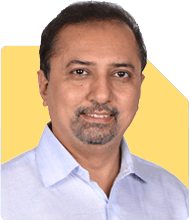I have 50 Lacs in fd.
I am saving 1.7lpm how to invest effectively to generate money.
I am 26 year old now.
Ans: Let’s break down your investment strategy step-by-step. You have Rs 50 lakhs in a fixed deposit, and you save Rs 1.7 lakhs per month. That's an amazing start at 26 years old. Your commitment to saving and investing wisely will help you build a strong financial future. Let’s dive into how you can invest this money effectively.
Assessing Your Current Situation
First, it’s important to understand where you stand financially. You have a substantial amount saved in a fixed deposit and a healthy monthly savings rate. This shows you have a strong foundation. But fixed deposits offer low returns compared to other investment options.
Understanding Investment Goals
Before diving into specific investments, let’s define your goals. At 26, you likely have long-term goals such as retirement, buying a home, or starting a business. Identifying these goals will guide your investment choices. Here’s a breakdown of common goals:
Retirement: Aim to build a corpus that will support you post-retirement.
Buying a Home: Plan for a down payment and home loan repayment.
Children’s Education: If you plan to have children, consider their future education expenses.
Travel and Lifestyle: Fund future travel and lifestyle aspirations.
Diversifying Your Investments
Diversification is crucial. It means spreading your investments across different assets to minimize risk. Here’s a diversified investment plan tailored for you:
Mutual Funds
Mutual funds are excellent for long-term growth. They offer diversification and professional management. Here’s how you can allocate your savings in mutual funds:
Equity Mutual Funds: These are ideal for long-term growth. They invest in stocks and have the potential for high returns. They are divided into various categories:
Large Cap Funds: Invest in large, well-established companies.
Mid Cap Funds: Invest in mid-sized companies with high growth potential.
Small Cap Funds: Invest in smaller companies with high growth potential but higher risk.
Flexi Cap Funds: Invest in a mix of large, mid, and small cap stocks.
Debt Mutual Funds: These funds invest in bonds and other debt securities. They are less risky compared to equity funds and provide steady returns.
Hybrid Funds: These funds invest in a mix of equity and debt. They balance the risk and return.
Advantages of Mutual Funds
Diversification: Mutual funds invest in a variety of securities, reducing risk.
Professional Management: Managed by experienced fund managers.
Liquidity: Easy to buy and sell.
Compounding: Reinvested returns generate more returns over time.
Risks of Mutual Funds
Market Risk: Equity funds are subject to market fluctuations.
Credit Risk: Debt funds carry the risk of default by issuers.
Interest Rate Risk: Changes in interest rates affect debt fund returns.
Systematic Investment Plan (SIP)
A SIP allows you to invest a fixed amount regularly in mutual funds. It’s a disciplined way to invest and averages out the cost of investment. Considering your monthly savings, you can allocate Rs 1.7 lakhs across different SIPs:
Equity Funds: Allocate a significant portion here for long-term growth.
Debt Funds: Allocate a smaller portion for stability.
Hybrid Funds: Balance the rest between equity and debt.
Direct vs. Regular Mutual Funds
You might consider direct funds, but they have disadvantages. Direct funds require you to choose and manage funds yourself. This can be challenging without expertise. Investing through a Mutual Fund Distributor (MFD) with a Certified Financial Planner (CFP) credential has benefits:
Expert Guidance: CFPs provide personalized advice.
Regular Monitoring: Your portfolio is regularly reviewed and rebalanced.
Convenience: CFPs handle paperwork and transactions.
Avoiding Index Funds
Index funds track a market index and offer lower fees but also lower returns. Actively managed funds, on the other hand, aim to outperform the market through skilled management. Here’s why actively managed funds might be better:
Potential for Higher Returns: Fund managers can capitalize on market opportunities.
Flexibility: Managers can adjust the portfolio in response to market conditions.
Stocks
Investing in individual stocks can be rewarding but also risky. Given your age, you can allocate a portion of your portfolio to stocks for higher returns. However, stock picking requires research and understanding of the market.
Public Provident Fund (PPF)
PPF is a long-term savings scheme with tax benefits. It’s a safe investment with decent returns. You can allocate a portion of your savings here for stability and tax benefits.
National Pension System (NPS)
NPS is designed for retirement savings. It offers tax benefits and a mix of equity and debt exposure. It’s a good option for long-term retirement planning.
Gold
Gold is a good hedge against inflation. You can invest in gold through Sovereign Gold Bonds (SGB) or gold mutual funds. It’s a safe investment but should be a smaller part of your portfolio.
Emergency Fund
Maintain an emergency fund equal to 6-12 months of your expenses. This fund should be easily accessible and kept in a savings account or liquid fund.
Insurance
Ensure you have adequate life and health insurance. This protects you and your family from unforeseen events.
Reviewing and Rebalancing
Regularly review your portfolio. Rebalance it based on market conditions and your goals. This ensures your investments stay aligned with your risk tolerance and objectives.
Long-Term Perspective
Investing is a long-term game. Be patient and avoid reacting to short-term market fluctuations. Stick to your plan and keep investing regularly.
Final Insights
You’re on a great path with your savings and financial discipline. By diversifying your investments and staying focused on your goals, you can build a substantial corpus over time. Remember, investing is not about timing the market but time in the market. Consistent and disciplined investing will yield the best results.
Best Regards,
K. Ramalingam, MBA, CFP
Chief Financial Planner
www.holisticinvestment.in

























